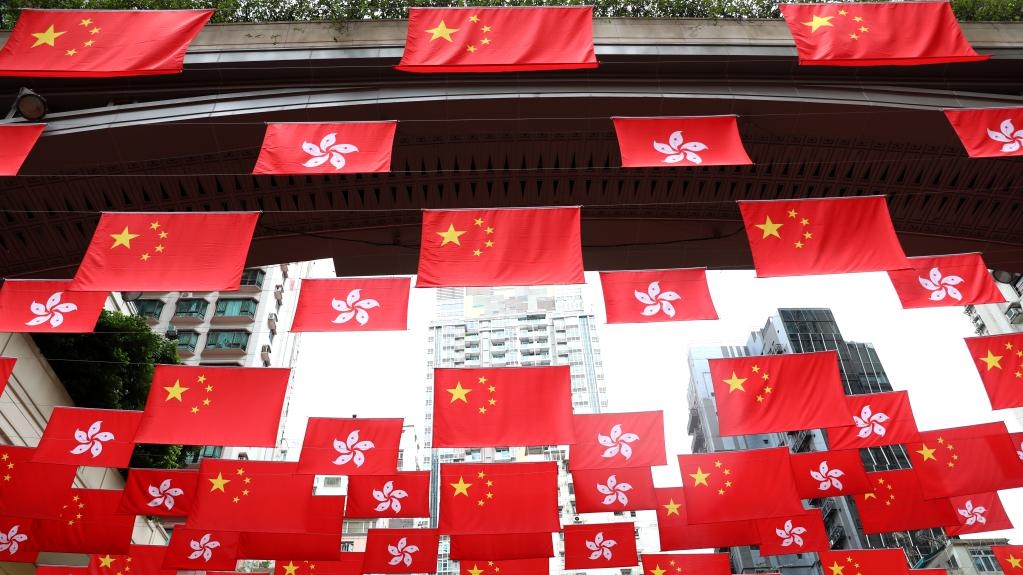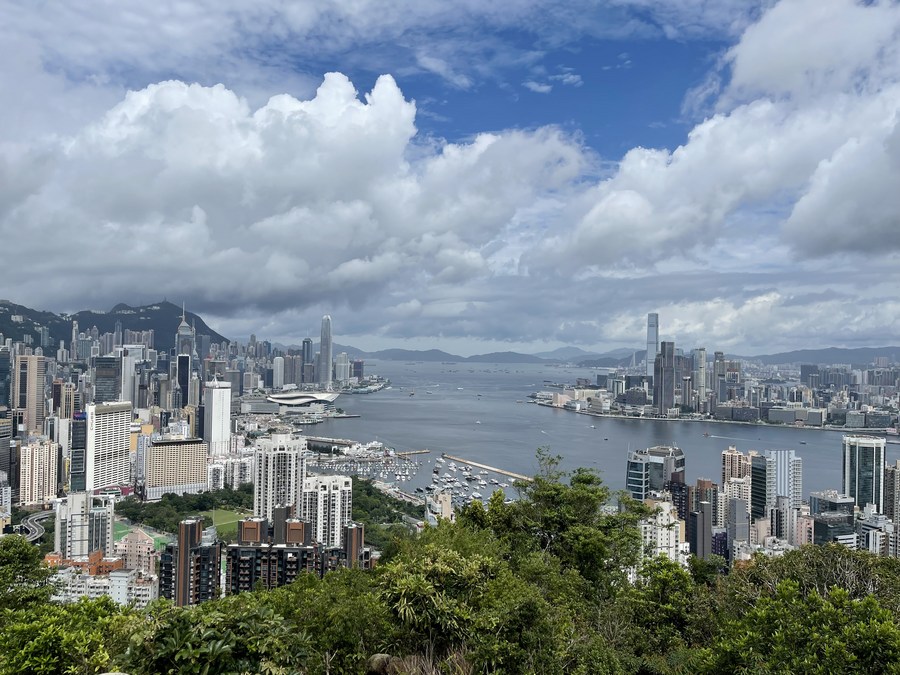
China's national flags and the Hong Kong Special Administrative Region (HKSAR) flags are hung above a street in Hong Kong, south China, June 19, 2022. /Xinhua
China's national flags and the Hong Kong Special Administrative Region (HKSAR) flags are hung above a street in Hong Kong, south China, June 19, 2022. /Xinhua
Editor's note: Xin Ge is an associate professor at the School of Public Economics and Administration, Shanghai University of Finance and Economics. The article reflects the author's opinions and not necessarily the views of CGTN.
July 1, 2022, marks the 25th Anniversary of Hong Kong's return to China and establishment of the Hong Kong Special Administrative Region (HKSAR) of the People's Republic of China. Chinese President Xi Jinping celebrated the anniversary of Hong Kong's return to the motherland and inaugural ceremony of the sixth-term government of the HKSAR.
As Xi said, the "One Country, Two Systems" governing principle has been tested and and will continue to provide the best institutional guarantee for the city's long-term stability, prosperity and development.
Stability
Stability remains the cornerstone for overall development. The years since the establishment of HKSAR have not been plain sailing - the financial crises in 1997 and 2008, severe acute respiratory syndrome (SARS) in 2003, the social unrest and violence in 2019 and COVID-19 pandemic since 2020, but the city can turn crises into opportunities and emerged stronger with support from the central government.
In the first few years after the return, foreign speculators delivered a blow against Hong Kong on both stock and currency markets in 1998 and the unemployment once reached as high as 7.9 percent in 2003 due to the property bubble popping and SARS outbreak. But nowadays, Hong Kong's bank capital adequacy ratio and bank liquidity indicators are both higher than international standards, and bad debt ratio is relatively low.
Recently, Hong Kong has been hit hard by the COVID-19 pandemic, resulting in immense difficulties to the grassroots and local businesses.
The central government, and a number of mainland provinces dispatched public health support teams to Hong Kong. The pandemic did take a toll on the economy but the impact has been stabilized, with a quick rebound in consumption and better business conditions.
In the political aspect, the Article 2 of the Basic Law clearly writes that the National People's Congress (NPC) authorizes the HKSAR to exercise a high degree of autonomy and enjoy executive, legislative and independent judicial power. It indicates that the authorization stems from the NPC, refuting any attempt to argue that Hong Kong was some sort of "floating sovereign entity."
The promulgation of the Law of the People's Republic of China on Safeguarding National Securityin the HKSAR in June, 2020, offered the legal framework to safeguard national security, restoring stability.
Furthermore, with improvements to the electoral system and adhering to the principle of "patriots governing Hong Kong" since 2021, the practice of "One Country, Two Systems" has been brought back on track and the constitutional order of HKSAR was restored. As President Xi said, "Upholding national sovereignty, security and development interests is the paramount principle in the policy."

The view at the Victoria Harbor in Hong Kong, south China, June 22, 2022. /Xinhua
The view at the Victoria Harbor in Hong Kong, south China, June 22, 2022. /Xinhua
Prosperity
The "One Country, Two Systems" principle has made Hong Kong one of the most diversified and innovative cities in the world and natural gateway to and from the mainland, the rest of Asia and beyond.
Hong Kong's successes in economic and social development are well presented by statistics. In the past 25 years, Hong Kong's overall economy has more than doubled, with the GDP climbing from HK$1.37 trillion (about $176 billion) in 1997 to HK$2.89 trillion (about $368 billion) in 2021. As a high-income economy with a per capita of around $46,700, the annual growth rate has still averaged 3.54 percent in the past two decades, with an average inflate rate as low as 1.5 percent.
If we examine closer the factors contributing to the economic development in Hong Kong, it heavily depends on international trade. According to the World Trade Organization, Hong Kong remained the world's sixth largest exporter of merchandise trade in 2020. Chinese mainland has been Hong Kong's largest trading partner since 1985, with its share in the city's total global trade increasing from 9.3 percent in 1978 to 51.8 percent in 2020.
Additionally, Hong Kong's populations reached about 7.4 million, increasing by one million from 25 years ago. According to the World Bank, life expectancy at birth in Hong Kong is the highest in the world and local residents are enjoying long life expectancy due to improvements in public health measures, food availability and chronic disease treatment.
Opportunity
By adhering to the "One Country, Two Systems" and integrating it into national development, Hong Kong will continue to be a Chinese global city, not only a financial powerhouse, but a mediator between different cultures, such as the East and West.
Under the 14th Five-Year Plan (2021-2025), the central government underpins Hong Kong to enhance its competitive advantages - international centers for finance, transportation, trade, and legal and dispute resolution services, and develop emerging competitive advantages by building global hubs for aviation, innovations and technology center, as well as regional hubs for intellectual property trading and arts and cultural exchanges between China and the rest of the world.
The second major initiative is the Guangdong-Hong Kong-Macao Greater Bay Area (GBA), which encompasses much of the mainland's manufacturing and technological bases in Guangdong Province. The GBA aims to build a global innovation hub by leveraging strengths of a cluster of amazing cities. Not only Hong Kong energized this regional integration, but the initiative has driven the city forward with unprecedented momentum. In 2021, the GDP of the GBA boasts $1.96 trillion, 11 percent of the national GDP; and its GDP is projected to reach around $4.6 trillion by 2030.
Hong Kong also has a crucial role to play in the "dual circulation" new development paradigm. It not only participates in domestic circulation, but facilitates international circulation, which would contribute to the country's overall development. Hong Kong's future hinges on a closer linkage with the mainland in different ways.
All these achievements of HKSAR in the past quarter century would have been impossible without the steadfast implementation of "One Country, Two Systems" under the leadership of the Communist Party of China. Upholding this principle, we rest assured that HKSAR can give play to its unique advantages for a brighter future and make new contributions to the great rejuvenation of the Chinese nation.
(If you want to contribute and have specific expertise, please contact us at opinions@cgtn.com. Follow @thouse_opinions on Twitter to discover the latest commentaries in the CGTN Opinion Section.)

